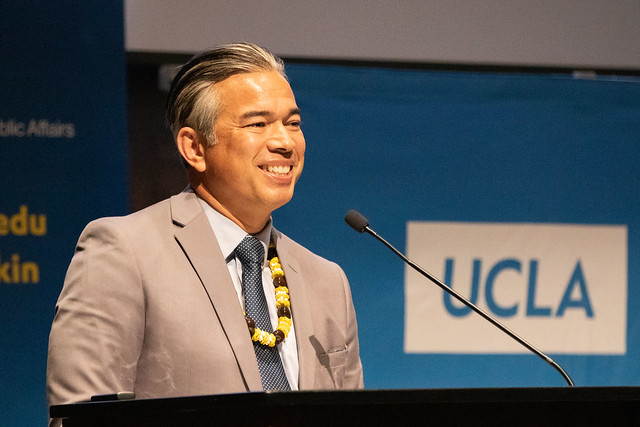By Jessica Wolf
California has extended eviction protections to June 30 for hundreds of thousands of renters made vulnerable by the pandemic’s economic disruptions, yet tens of thousands of renters who might need assistance remain either unaware of the program or face barriers to applying.
This problem is especially acute among tens of thousands of low-income Asian and Latino households that are behind on rent and have not yet applied, according to a new UCLA report (PDF).
“We find that not much has changed since the onset of the pandemic — lower-income people and people of color are disproportionately struggling to pay the rent,” said Paul Ong, director of UCLA’s Center for Neighborhood Knowledge, who led the study.
The state currently has an enormous backlog of applicants attempting to access California’s Emergency Rental Assistance Program, which launched in spring 2020. More than half a million California renters have applied to the state’s relief program as of March 29, 2022.
To gauge how effective the rental assistance program has been, researchers from Ong’s center, along with colleagues from UCLA’s Latino Policy and Politics Initiative, Asian American Studies Center and Chicano Studies Research Center, examined the U.S. Census Bureau’s weekly Household Pulse Survey data gathered from July 21, 2021, to Jan. 10, 2022. They then compared it to publicly available information about renters who have applied for California’s rental assistance program.
The researchers found that Asian and Latino households are severely underrepresented among those who have managed to receive rent relief, compared to non-Latino white renters, even when accounting for income, age and metropolitan area of residence.
The report’s authors are calling for lawmakers to consider maintaining benefit programs like rental assistance and other safety-net initiatives until unemployment numbers for people of color in California drop below pre-pandemic levels.
“These findings reveal that funds have not been equitably distributed to those with the greatest needs,” said Melany De La Cruz-Viesca MA UP ’02, deputy director of the Asian American Studies Center.
Asian American renters had the lowest application rate for rental assistance, the report found. Only 25% of rent-distressed Asian American households applied for relief, compared to almost 50% of white renters and 64% of Black renters. The second-lowest application rate was among rent-distressed Latinos at only 39%. Rent-distressed is defined in the report as households that reported being behind on rent or would otherwise have been without assistance.
While 21% of white households and 20% of Black households received rent relief from the program, just 11% of Asian households and 14% of Latino households did.
Overall, the report notes that an estimated 14% of California renters are behind on their rent and 15% fear facing the threat of eviction. Roughly 10 times as many low-income renters are behind on their rent, compared to upper-income renters (21% compared to 2%, respectively). More than twice as many Asian American, Black and Latino renters are struggling to keep up relative to their white counterparts.
“We believe that the inequality facing Asians and Latinos is due in part to language barriers, citizenship status, access to technology and lack of robust community information,” said Urban Planning Professor Veronica Terriquez, director of the Chicano Studies Research Center.
The report notes that the Census’ Household Pulse Survey is not conducted in any Asian languages, further limiting information about how Asian American households are faring as the pandemic enters a third calendar year.
The most potent thing California lawmakers can do, the report stresses, is indefinitely extend the rental assistance and other safety net programs such as utility shut-off protection and food security programs, until unemployment rates for all racial groups fall below pre-pandemic rates.
Overall, around 60% of distressed renters in California either did not apply to rent-relief programs even though they struggled to keep up with rent or they applied and were denied relief, the report found.
“Part and parcel with that is designing and expanding programs to reach eligible renters, including funding community-based organizations as trusted messengers,” said Silvia González MURP ’13 Ph.D. ’20, director of research for the Latino Policy and Politics Initiative. “We believe there are a significant number of distressed renters who are unaware of the emergency assistance program or are afraid to apply.”


